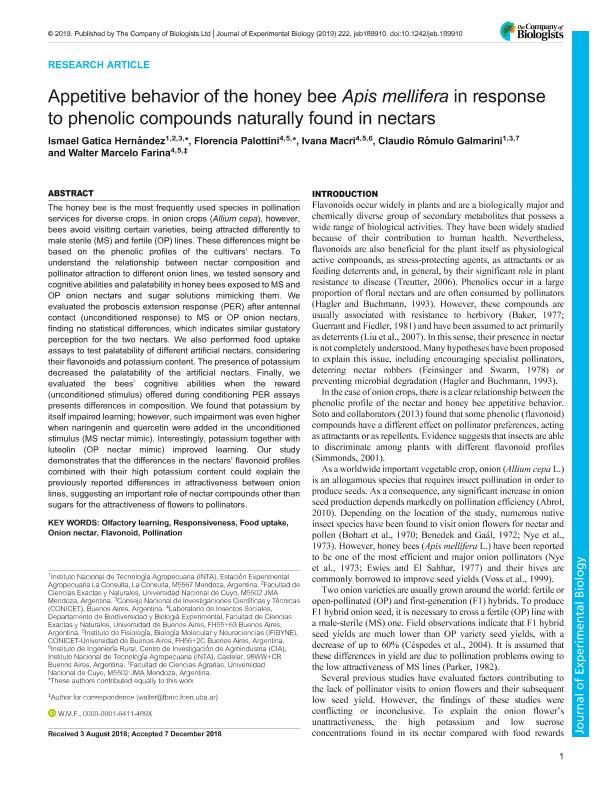Artículo
Appetitive behavior of the honey bee apis mellifera in response to phenolic compounds naturally found in nectars
Gatica Hernández, Ismaél Jairo Gabriel ; Palottini, Florencia
; Palottini, Florencia ; Macri, Ivana Noelia
; Macri, Ivana Noelia ; Galmarini, Claudio Romulo
; Galmarini, Claudio Romulo ; Farina, Walter Marcelo
; Farina, Walter Marcelo
 ; Palottini, Florencia
; Palottini, Florencia ; Macri, Ivana Noelia
; Macri, Ivana Noelia ; Galmarini, Claudio Romulo
; Galmarini, Claudio Romulo ; Farina, Walter Marcelo
; Farina, Walter Marcelo
Fecha de publicación:
01/2019
Editorial:
Company of Biologists
Revista:
Journal of Experimental Biology
ISSN:
0022-0949
Idioma:
Inglés
Tipo de recurso:
Artículo publicado
Clasificación temática:
Resumen
The honey bee is the most frequently used species in pollination services for diverse crops. In onion crops (Allium cepa), however, bees avoid visiting certain varieties, being attracted differently to male sterile (MS) and fertile (OP) lines. These differences might be based on the phenolic profiles of the cultivars’ nectars. To understand the relationship between nectar composition and pollinator attraction to different onion lines, we tested sensory and cognitive abilities and palatability in honey bees exposed to MS and OP onion nectars and sugar solutions mimicking them. We evaluated the proboscis extension response (PER) after antennal contact (unconditioned response) to MS or OP onion nectars, finding no statistical differences, which indicates similar gustatory perception for the two nectars. We also performed food uptake assays to test palatability of different artificial nectars, considering their flavonoids and potassium content. The presence of potassium decreased the palatability of the artificial nectars. Finally, we evaluated the bees’ cognitive abilities when the reward (unconditioned stimulus) offered during conditioning PER assays presents differences in composition. We found that potassium by itself impaired learning; however, such impairment was even higher when naringenin and quercetin were added in the unconditioned stimulus (MS nectar mimic). Interestingly, potassium together with luteolin (OP nectar mimic) improved learning. Our study demonstrates that the differences in the nectars’ flavonoid profiles combined with their high potassium content could explain the previously reported differences in attractiveness between onion lines, suggesting an important role of nectar compounds other than sugars for the attractiveness of flowers to pollinators.
Archivos asociados
Licencia
Identificadores
Colecciones
Articulos(CCT - MENDOZA)
Articulos de CTRO.CIENTIFICO TECNOL.CONICET - MENDOZA
Articulos de CTRO.CIENTIFICO TECNOL.CONICET - MENDOZA
Articulos(IFIBYNE)
Articulos de INST.DE FISIOL., BIOL.MOLECULAR Y NEUROCIENCIAS
Articulos de INST.DE FISIOL., BIOL.MOLECULAR Y NEUROCIENCIAS
Articulos(SEDE CENTRAL)
Articulos de SEDE CENTRAL
Articulos de SEDE CENTRAL
Citación
Gatica Hernández, Ismaél Jairo Gabriel; Palottini, Florencia; Macri, Ivana Noelia; Galmarini, Claudio Romulo; Farina, Walter Marcelo; Appetitive behavior of the honey bee apis mellifera in response to phenolic compounds naturally found in nectars; Company of Biologists; Journal of Experimental Biology; 222; 2; 1-2019; 1-8
Compartir
Altmétricas



